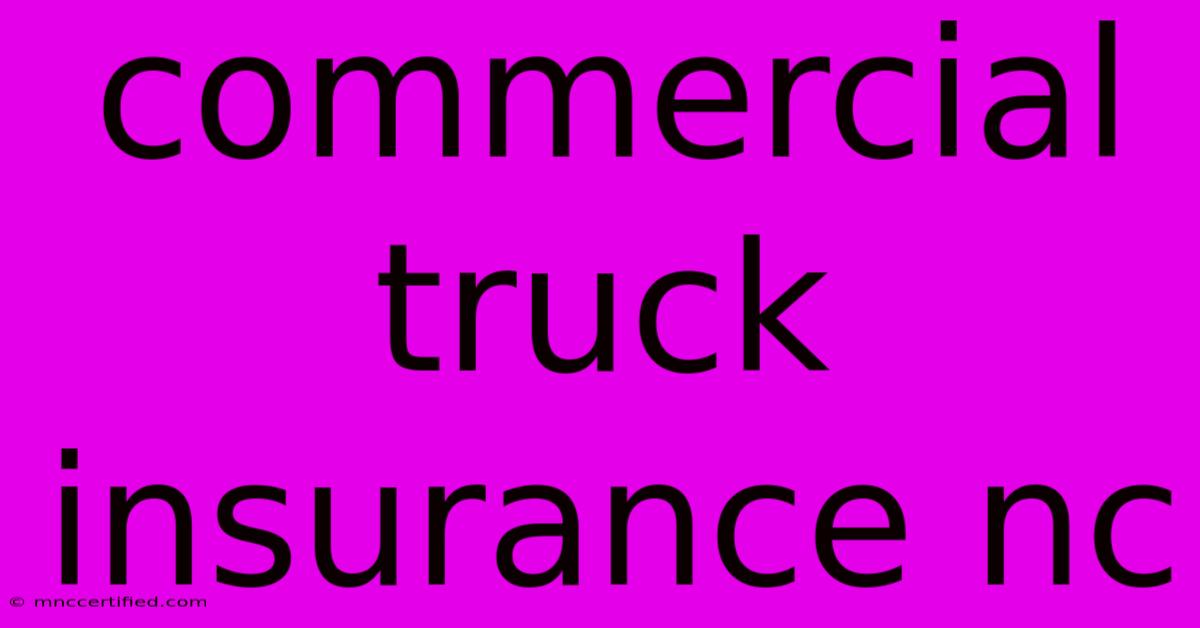Commercial Truck Insurance Nc

Table of Contents
Navigating the World of Commercial Truck Insurance in North Carolina
Finding the right commercial truck insurance in North Carolina can feel like navigating a maze. With so many providers, policies, and coverage options, it's easy to get lost. This comprehensive guide will help you understand the intricacies of NC commercial truck insurance, empowering you to make informed decisions and protect your business.
Understanding Your Needs: Types of Commercial Truck Insurance in NC
Before diving into specific policies, it's crucial to understand the various types of commercial truck insurance available in North Carolina. Your specific needs will depend on factors like the size of your fleet, the type of cargo you haul, and your operating radius. Key types include:
-
Liability Insurance: This is the most basic and often legally required coverage. It protects you financially if you're at fault in an accident causing property damage or bodily injury to others. North Carolina has specific minimum liability requirements, so understanding these limits is paramount.
-
Collision Coverage: This covers damage to your truck caused by a collision, regardless of fault. It's essential for protecting your significant investment.
-
Comprehensive Coverage: This protects your truck against damage from non-collision events such as theft, vandalism, fire, or weather-related incidents.
-
Cargo Insurance: If you haul goods, cargo insurance protects your cargo against loss or damage during transit. The value of your cargo directly impacts the premium.
-
Bobtail Insurance: This covers liability when your truck is not attached to a trailer. Crucial for owner-operators.
-
Uninsured/Underinsured Motorist Coverage: This protects you if you're involved in an accident with an uninsured or underinsured driver. This is vital given the potential for severe accidents involving large trucks.
-
Physical Damage Coverage: This umbrella term encompasses collision and comprehensive coverage, protecting your vehicle from various types of damage.
Factors Affecting Your Commercial Truck Insurance Premiums in NC
Several factors influence the cost of your commercial truck insurance premium in North Carolina:
-
Driving Record: A clean driving record significantly impacts your premium. Accidents and violations can lead to higher rates.
-
Truck Type and Size: Larger trucks and those carrying hazardous materials generally command higher premiums due to increased risk.
-
Years of Experience: More experienced drivers often receive lower rates due to a lower perceived risk.
-
Annual Mileage: Higher annual mileage translates to a greater likelihood of accidents, leading to higher premiums.
-
Location: Your business location and the areas you operate in affect your risk profile. High-traffic areas may result in higher premiums.
-
Safety Programs: Implementing and maintaining a strong safety program can demonstrate your commitment to risk mitigation and potentially earn you discounts.
-
Insurance History: Your past insurance claims history is a major factor in determining your current premium.
Finding the Right Commercial Truck Insurance Provider in NC
Shopping for commercial truck insurance requires diligent research. Consider these steps:
-
Get Multiple Quotes: Don't settle for the first quote you receive. Compare quotes from several reputable insurers.
-
Read the Fine Print: Carefully review policy details, paying close attention to coverage limits, exclusions, and deductibles.
-
Check for Discounts: Many insurers offer discounts for safe driving, multiple-vehicle policies, and safety training programs.
-
Consider Your Budget: Balance the cost of premiums with the level of coverage you need.
-
Seek Professional Advice: Consult with an independent insurance agent who can help you navigate the complexities of commercial truck insurance and find the best policy for your needs.
Staying Compliant: North Carolina Regulations for Commercial Truck Insurance
Understanding and complying with North Carolina's regulations is critical. Failure to maintain adequate insurance can result in severe penalties. Always verify the minimum liability requirements and ensure your policy meets or exceeds those requirements.
This article provides general information and should not be considered legal or insurance advice. Always consult with qualified professionals for personalized guidance. Protecting your business and ensuring compliance are crucial steps in successfully operating commercial trucks in North Carolina.

Thank you for visiting our website wich cover about Commercial Truck Insurance Nc. We hope the information provided has been useful to you. Feel free to contact us if you have any questions or need further assistance. See you next time and dont miss to bookmark.
Featured Posts
-
William And Kate Honor Teen Liz Hatton
Nov 29, 2024
-
Fiona Phillips Family Update
Nov 29, 2024
-
Fundraiser Paused Slater Family Oswaldtwistle
Nov 29, 2024
-
Convicted Spy Escaped Soldier Iran Links
Nov 29, 2024
-
Black Friday 2024 Home And Fashion Sales
Nov 29, 2024